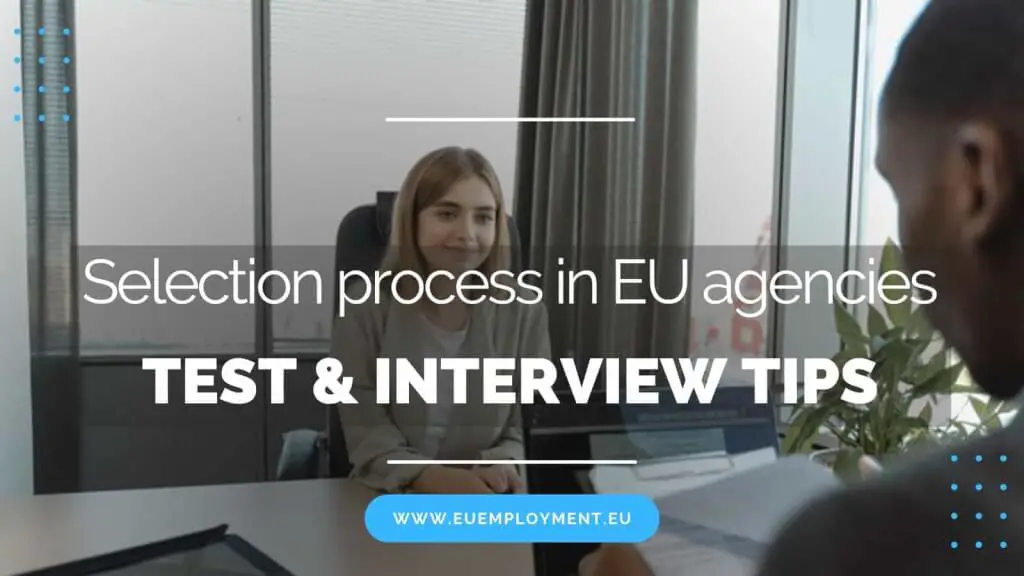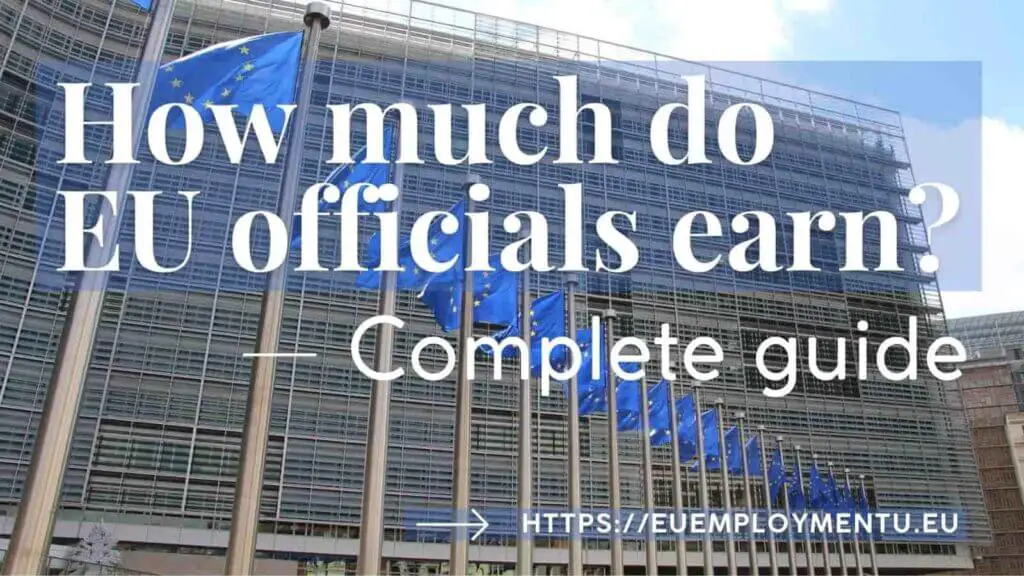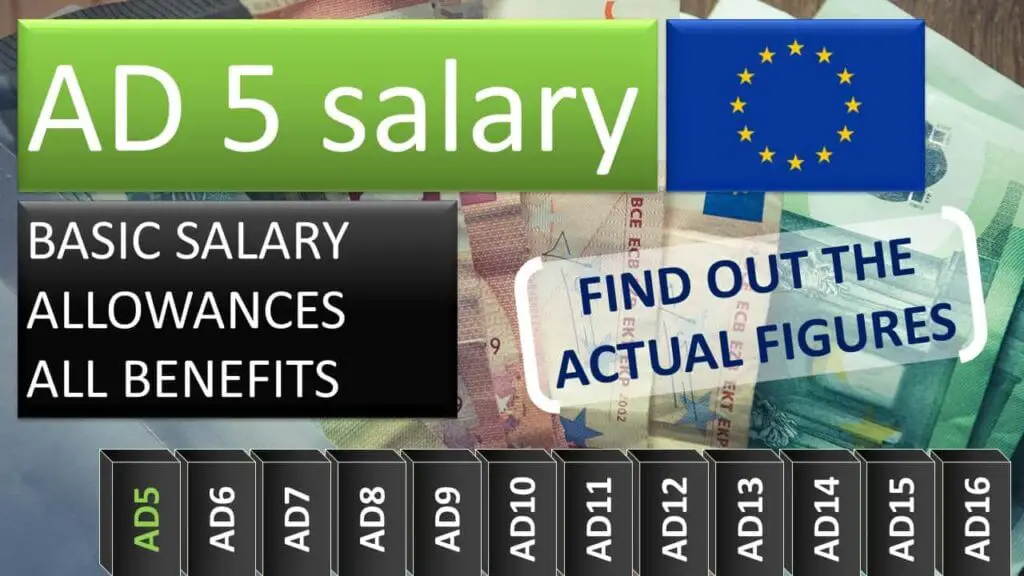Have you ever wondered how EU agencies select winners in their job competitions? Have you been invited to a test and/or an interview, and would like to know what to expect? This article will provides answers.
Stages of selection process
01 | Review of applications and shortlisting
EU institutions usually receive at least several tenths of applications for each vacancy announcement. This number can go into hundreds if the vacancy is for a general profile and there are many positions to fill. Vacancy announcements to establish a ‘reserve list’ are in the latter category.
It is the job of the Selection Committee to comb through all applications and decide which applicants (majority) do not advance to further stages, and which (minority) get invited to the test and the interview.
If you’ve ever looked at an EU institution’s job advertisement, all of them contain “Eligibility criteria” and “Selection criteria“. You have to satisfy all Eligibility criteria to be even considered for a position. In most circumstances, if you don’t satisfy even one of these, you should be disqualified from further competition.
Common Eligibiliy criteria for jobs in EU institutions:
- Completed studies (secondary school, bachelors degree, masters degree depending on the seniority of position)
- A certain number of work experience years (can be 0 for entry level positions)
- Thorough knowledge of one of the official languages of the European Union (usually native language) and a satisfactory knowledge of another of the EU official languages (usually English, French, German, Spanish, but can in fact be any of the official EU languages)
- Citizenship of an EU Member States
- Be entitled to his/her full rights as a citizen (previous criminal conviction is an obstacle to employment in EU instititutions)
- If applicable, passed military service requirements
- Required physical fitness to do the job as tested in a medical examination
Selection criteria are used to further narrow down the list of applicants to those invited to further stages of the selection process. The more candidates apply, the more of Selection criteria successful candidates have to comply with to be invited to the test and the interview, a process also know as “shortlisting”.

02 | Test and interview
Those candidates who have been ‘shortlisted’ among all applicants, are invited to a test and interview. For cost saving reasons, it is increasingly common that both take place on the same day at the institution’s headquarters. Rarely, but institutions are known to split testing and interviewing. In this case some or all stages will take place remotely. The SARS-CoV-2 pandemic really facilitated this practice, due to the low cost of video-conferencing solutions compared to having to fly-in candidates. Multiple stages of in-person tests and interviews are usually only practised for higher level positions like head of unit and upwards.
In situations when there is a very large number of applicants, in order to decrease the number of candidates for considerations some EU institutions practice ‘pre-testing’. This is a test that usually does not yet check candidates’ specific area-related knowledge, but more general skills and knowledge like English and writing or logical thinking.
Test
The tests at EU agencies are nothing like the EPSO tests, where for most people the math and logical reasoning exercises are an insurmountable obstacle. Agencies almost universally these days ask candidates to carry out a number of exercises related to likely tasks in the particular role.
A typical example would ask you to read a 5-20 page document and produce a number of written outputs based on the document and common sense. One of these outputs could be a letter or a formal email to test multiple skills related to writing such as English, drafting, clarity of expression, writing for a particular audience, ability to deliver on a specific task under time pressue. The second task is usually more complicated and could be the drafting of a longer text such as a concept or background note for your superior, event agenda or a short plan to organize a a meeting or another event, etc.
If the vacancy is related to a specific policy or professional field, you might be given a more specific test. For example, for communications vacancies you might be asked to write a press release or a speech, or a popular language summary of a research report. If you are applying for a position requiring statistical skills, you might be required to work with a dataset. For procurement positions, the task might require knowledge of procurement administrative procedures.
One of the more interesting tasks I’ve heard about during the testing phase – the applicant was asked to prepare a PowerPoint presentation about herself, which she had to present during the interview. Needless to say, the position did involve lots of PPT production for management and presenting the agency at events.
Interview
You might have experience that job interview are all over the place, with random questions where it’s hard to understand their relevance. Not so in EU agencies.
Because the selection process has to be as objective and fair as possible, all candidates get asked the same questions and are scored and ranked based on their performance in replying to them.
At least one question is asked by each Selection Committee member. Each Selection criterion is usually covered with one or two questions. As an example, the below table lists Selection Criteria for a vacancy at the Fundamental Rights Agency (FRA) and possible questions linked to each criterion.
“Essential” criteria mean that you usually have to comply with all of these criteria. For “Advantageous” criteria, the more you comply with any or all of these, the greater your chances of getting an interview and scoring the position.
| Selection Criterion | Question |
|---|---|
| ESSENTIAL Minimum professional experience of four years in performing the tasks described under functions and duties | Tell us about instances where you have performed duties similar to this position? |
| Sound relevant professional experience related to administrative tasks (either to finance and contracting or to human resources in an international environment) | * What is a typical workflow of an invoice at an EU agency? * What are the steps to prepare a vacancy announcement? |
| Sound experience in the use of Microsoft Office suite i.e. MS WORD, EXCEL, POWERPOINT and OUTLOOK and, in particular, MS EXCEL for the preparation of periodic reports and data analysis | Usually tested during the practical exercise. |
| Very good knowledge and experience in financial management and/or human resources management procedures applicable to public administration | * What legislation governs financial management/human resources in EU agencies? * Tell us about a non-standard administrative problem you have encountered and how did you proceed to solve it? |
| Proven experience in drafting administrative notes and reports | What reports have you draft in the recent past (1, 3, 5 years)? |
| Excellent communication, organisational and interpersonal skills dealing will all levels of management within the organisation | Tell us about a conflict with a colleague and did you address this? |
| Service oriented, flexible and with ability to work effectively within a multicultural team | Do you like working with colleagues from various EU countries? What is it that you like about multiculturalism/multicultural teams? |
| Strong analytical skills, accuracy and attention to detail | * Tell us about a mistake you have made in the past, and what did you do after making it? * Also tested during practical exercise. |
| Very good command of oral and written English (at least B2 level) | Usually tested during the practical exercise, and generally during the interview without a particular question. |
| ADVANTAGEOUS: | |
| Very good knowledge of the EU Financial Regulations and/or Staff Regulations | A question about a particular common problem situation in finance or HR, and your reaction to it. |
| Work experience in a multicultural/multilingual environment | Have you experienced challenges in working with colleagues from other countries? How did you overcome these? |
| Experience working with reporting applications/tools like, but not limited to, Microsoft ACCESS, PowerBI, Business Objects | Usually tested during the practical exercise, and generally during the interview without a particular question. |
| Very good knowledge of IT tools used for document management like Microsoft SharePoint | Usually tested during the practical exercise, and generally during the interview without a particular question. |
If you have listed knowledge of particular languages in your CV/application, be ready that you might be asked a question and expected to respond in the particular language. This can happen even if the language is not a requirement for the particular position. Even if your skills are not very good, consider practicing at least a basic conversation. Typical questions you might be asked to answer are “Tell us about yourself?”, “Where and how did you learn the language?”, “Can you briefly present our institution to an audience that hasn’t heard about us?”.
If you do not feel comfortable in talking in the particular language, prepare a short sentence in English or the language in advance, stating that you are still a student, but look forward to attending language classes and improving your skills so that you soon could converse with other colleagues and stakeholders. who speak the language.
03 | Issuing of offers and reserve list creation
After the test and interview stages the Selection committee ranks all candidates by received grades and creates a shortlist of candidates that are recommended for hiring. In EU lingo this is called a Reserve list.
The business unit in the respective EU institution can then choose the most appropriate candidate from the Reserve list and send an offer letter. The offer letter lists the position offered as well as the main tasks to be performed, and other vital information like duration of contract. If the person offered the job declines, the offer letter is sent to the next person chosed by the business unit.
Candidates are often curious about which place in a Reserve list they have. In fact, candidates in a reserve list are not ranked by a particular number and there is no priority for one candidate over the other. When drawing from a reserve list, the business unit looks at all candidates and selects the most appropriate person for a particular job.
Reserve lists are usually valid for two years with the possibility to extend them for at least another two years. This means that once you are on a reserve list, there is the possibility that you are offered a job several years after having participated in a job competition.
Because of the way the Reserve list system works it is important to apply to EU institutions that you want to work for whenever there are vacancies announced. Once a Reserve list for a particular job profile has been established, the agency will first use up all appropriate candidates from the list before running a new vacancy competition. This approach saves significant HR resources for EU institutions, but is something that “outsiders” don’t understand very well.
It likely is also the reason whey you sometimes don’t see relevant vacancy announcements from your favorite EU institution for years. They are hiring, just the offers go out to candidates who participated in competitions 1-4 years ago.
Share your experience
Have you recently taken part in a selection process for a job at an EU institution? Please share your experience in the comments section? We are particularly interested in types of tests, challenging or novel interview questions, interesting tasks and unexpected “twists”.







2 responses to “Tests and interviews in EU agencies”
Dear JDD, thanks for sharing. The tip about structuring your responses according to STAR and CAR might be very useful to other candidates!
I have recently passed an interview with an agency for an FGIV position and I got in the reserve list. Yesterday I received an e-mail about a second interview in the specific unit.
The first interview was very smooth with mostly “classic” interview questions for which anybody can find guidelines searching the internet. There where also some technical questions relating to the specific position for which I had mostly good answers but did not answer all of them 100%. That did not seem to bother the interviewers. The way I perceived it, they were at that point more keen to assess my work ethic, general experience and soft skills, as well as my proficiency in expressing myself in a foreign language, rather than technical details. For my answers I used the STAR and CAR formats and judging from the result, these were spot on.
Now I am preparing for the second interview, going over where I did good and what I can possibly do better, as well as making a refreshment style online seminar on some of the technical aspects of the job. Overall the interview was a very smooth experience and felt very amicable.